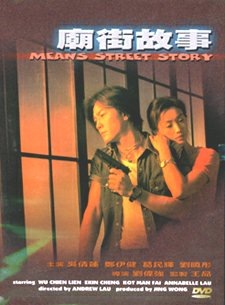Mean Street Story

Reviewed by YTSL
In an interview with Miles Wood, Andrew Lau stated
that: “Some people say in Hong Kong there are maybe over one million
in the Triads, which in the commercial world is a lot of people. So
I think that’s a lot of people to see your film, a lot of box office.
And everyday they have stories...” (In “Cine East: Hong Kong Cinema
Through the Looking Glass”, 1998:62). While this outlook may go some
ways towards helping one understand why it is that there are so many Hong
Kong movies in which Triads prominently feature, it doesn’t particularly explain
why too many of them are so terribly hackneyed; and this even prior to the
Triad layer being harnessed onto the kind of work whose main melodramatic
romantic plot looks to be a close cousin of those found in 1970s Taiwanese
weepies starring (Brigitte) Lin Ching-Hsia and either Charlie Chin or Chin
Han.

At least, things happen quicker in MEAN STREET STORY than the older works.
For instance, within the first 10 minutes or so of that which can appear
to be an unsuccessful precursor to the “Young and Dangerous” series of films,
Ekin Cheng’s character -- who is named in the English subtitles as Melvin
Wong but can be heard being addressed as Wong Miu -- is seen to: Celebrate
his birthday (first at the Mongkok nightclub where his mother is a singer,
then -- at the suggestion of his best friend -- across the border in Shenzhen);
catch sight of a lovely lass that you just know had instantly claimed his
heart; accidentally kill a man while trying to protect her from being harassed
by the thug and his friends; and jailed for four years for manslaughter (despite
the numerous bribery attempts of his distraught mother and others).
All this in addition to opening shots of Temple Street Market leading to
Melvin being shown as a child to have witnessed the violent death of his
father (whose last words include “Don’t join the Triad society” and “be righteous”
invocations) and the viewer being “treated” to the first of a number of corny
Cantopop montages that exist in this highly maudlin production.

Flash forward four years. Newly released from prison, Melvin returns
to Hong Kong -- and his Temple Street home area -- and finds that his remarried
mother (who is portrayed by Mimi Chu) has fallen on hard times and is now
the maid of a prostitute house while her husband is an alcoholic who no longer
owns the fleet of taxis he did a few year years earlier. On an apparently
cheerier note, soon after Melvin reunites with his best friend, he wins a
motorbike race and ownership of a bar for the rather pathetic -- and rather
infantile -- character alternately referred to as Crab or Ah Haai (played
by Eric Kot). Most importantly (at least for the story), a meeting
is successfully arranged between him and his lady love at first sight (The
woman variously referred to as Sue, Siu Suen and Vivian comes in the form
of sweet-faced Wu Chien-Lien).

Partly on account of Sue wanting to repay the man she considers her “benefactor”,
she gets him a job as a salesman in her father’s firm. Her snobbish
as well as rich father is not particularly pleased with the arrangement his
professional deejay daughter cooked up though, and frowns even more on what
is obviously a mutual attraction that was formed between clean-cut -- but
apt to be rebellious -- Sue and the former jailbird. Consequently,
he hatches a nefarious plan to bring Melvin a whole lot of trouble and hopefully
set him apart from Sue, and gets the slimy man (portrayed by Jimmy Wong)
he wants his daughter to marry to set it into motion. The problems
for Melvin get compounded with the insertion into this mix of Crab now being
a Triad and the lowlifers (one of whom is portrayed by Tommy Wong) enlisted
by Sue’s father and alternate suitor to aid them in their dirty scheme being
his Triad rivals and personal antagonists. Before too long then, matters
do end up getting really desperate and mean...

If only MEAN STREET STORY had focused on the romantic relationship between
the nice rich girl and the nice boy from the bad part of town. Instead,
Eric Kot -- who I found really annoying in this too eventful movie -- ended
up getting more time on screen (with Ekin Cheng) than the under-utilized
Wu Chien-Lien (who also had to share some of her screen time and space with
Annabelle Lau, who played here the kind of woman you would actually feel
sorry for Eric Kot’s character having ended up with). Furthermore,
while the fights that Andrew Lau shot in his trademark blurry stop-start
way were obviously there to spice things up, the end result -- as the 1995
film’s cinematographer-director confessed to Miles Wood -- was that “the
people don’t like it. They say “too fast, I felt dizzy when I see the
picture”” (“Cine East”, 1998:62). All in all, that may be a good description
of how I felt about the messy as well as frantic -- and ultimately way too
shallow plus insincere feeling -- movie as a whole.
My rating for this film: 4.5





